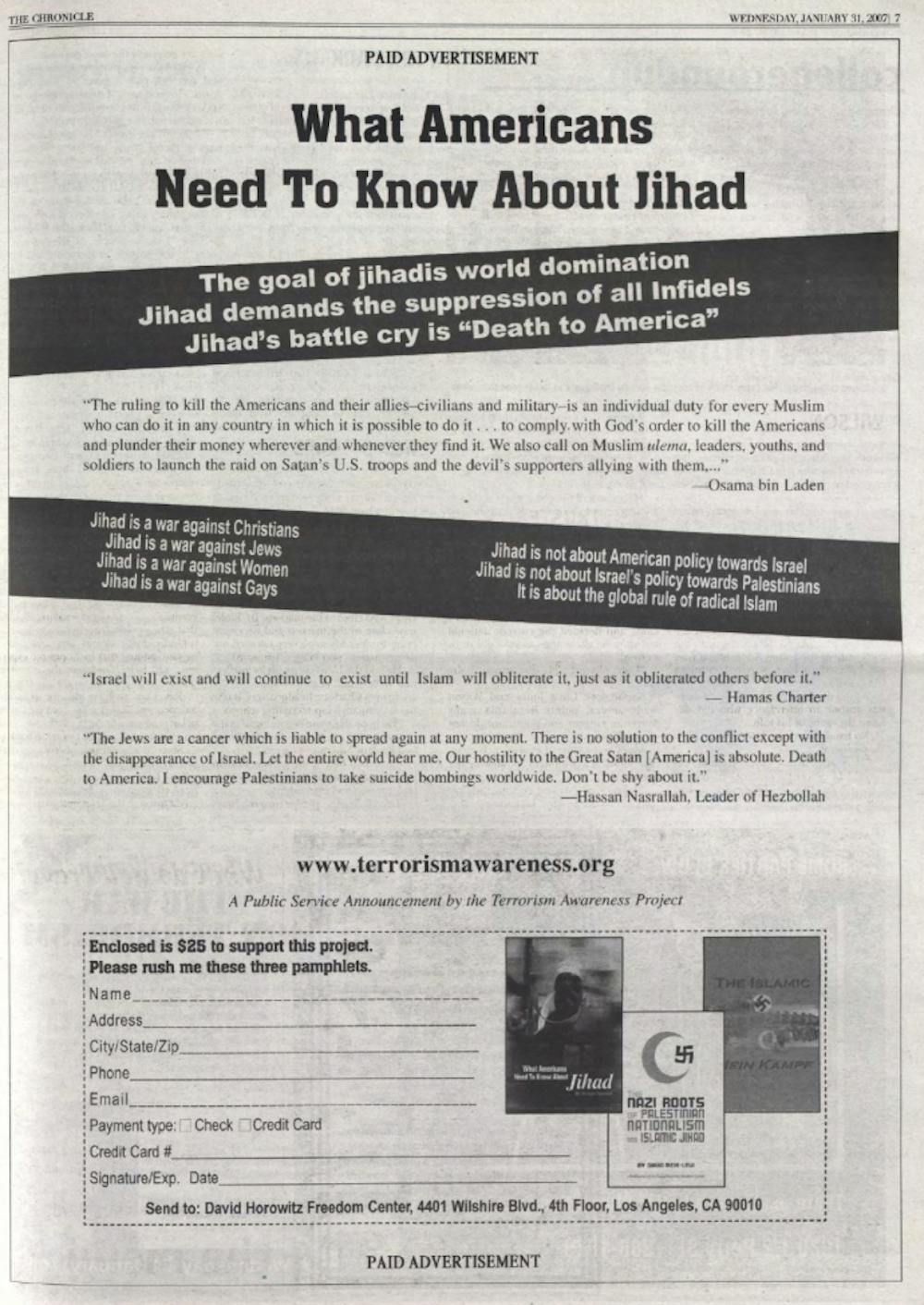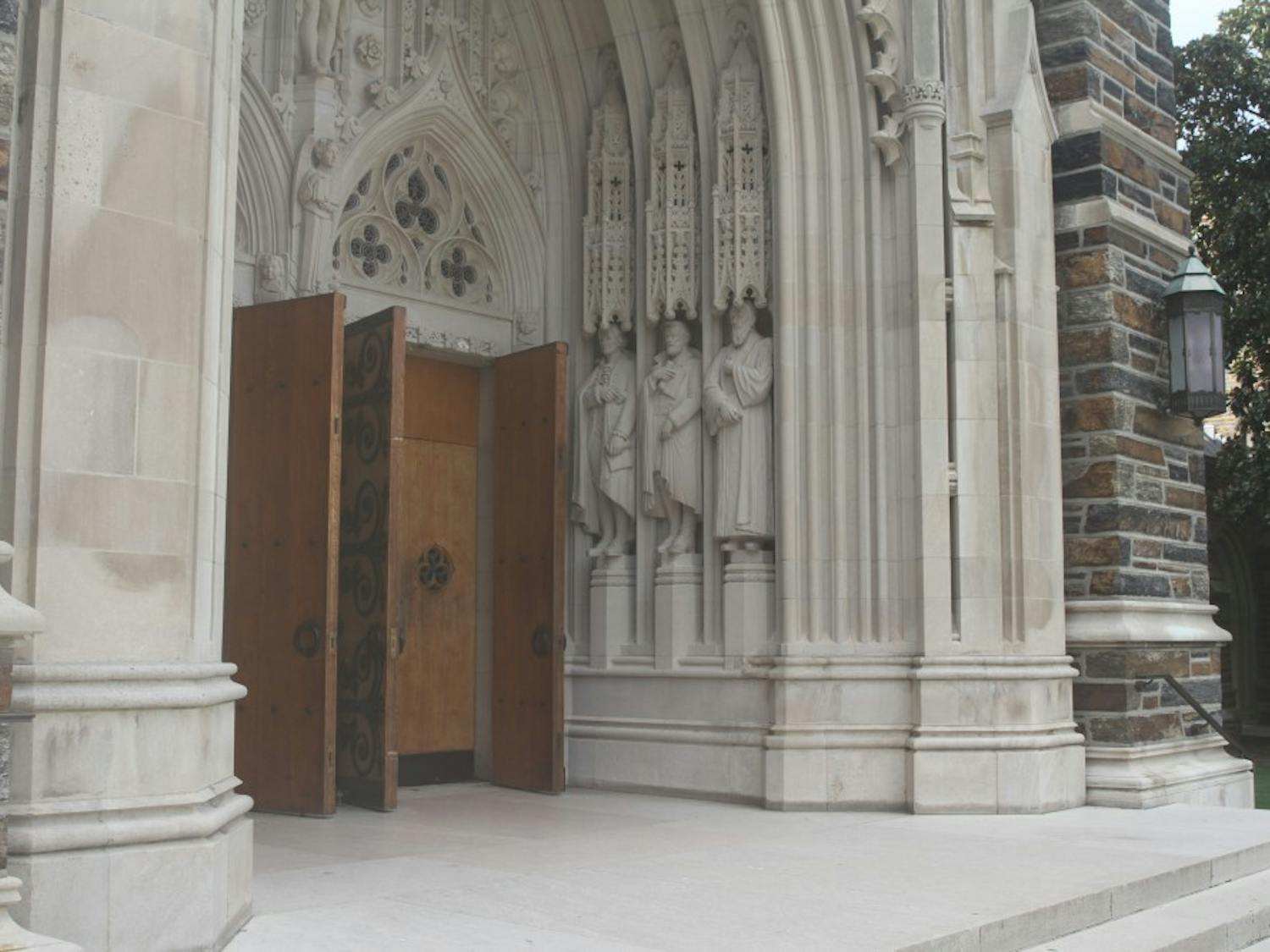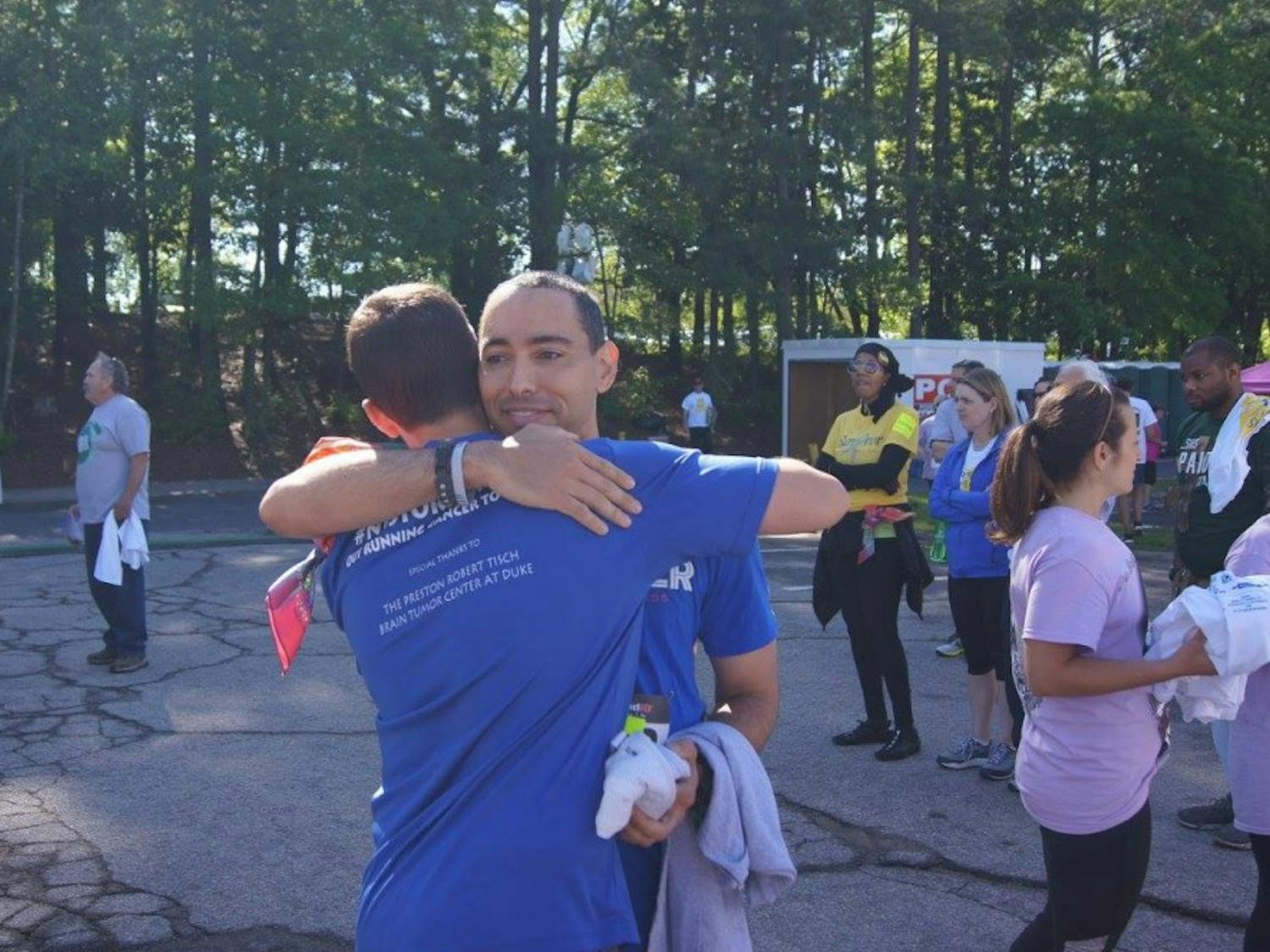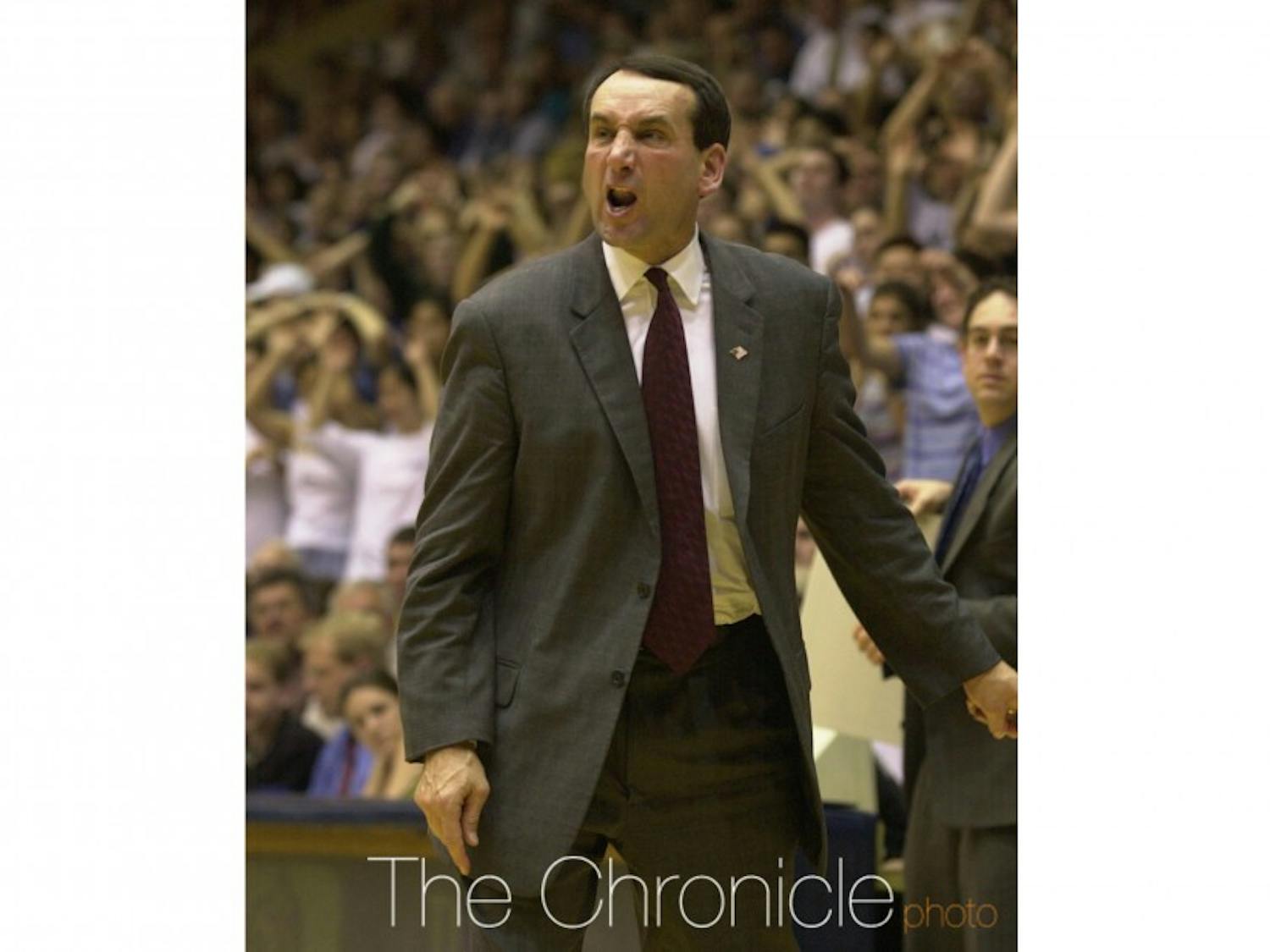To write the biggest speech of his career, Donald Trump turned to a trusted aide—Duke graduate Stephen Miller.
Miller, a senior policy advisor to Trump, wrote Trump’s keynote speech on the final night of the Republican National Convention. The speech echoed themes—including the urgency of securing America’s borders and the need to forgo political correctness—that have been cornerstones of Miller’s political philosophy dating back to his time on campus.
“Our convention occurs at a moment of crisis for our nation,” Trump said as he began his 75-minute address. “The attacks on our police, and the terrorism in our cities, threaten our very way of life. I will restore law and order to our country. Believe me. Believe me.”
The speech was instantly polarizing, drawing both high praise and harsh criticism. But attention is nothing new for Miller, Trinity '07, who has been unafraid to wade into controversy since his time at Duke.
Miller did not respond to requests for comment via LinkedIn and the press office of the Trump campaign. A representative from the Duke Alumni Association said the office has no contact information for Miller, noting that the office relies on self-reported information.
A firebrand columnist
Miller—who introduces Trump at many of his rallies—wrote 20 columns for The Chronicle, published in 2006 and 2007, which reveal a student confident in his political ideology with a penchant for strong rhetoric.
“We are told not to speak truthfully or even clearly, but instead in a fashion that is politically correct,” Miller wrote in his final column, using language that would be right at home in a Trump speech. “These politically correct dictates are anathema to American values.”
In addition to decrying political correctness, Miller also pushed for a stronger defense against terrorism and better border control in his early columns—both of which are core talking points for the Trump campaign.
“Islamic terrorists have declared holy war on the United States,” he wrote in “Unpatriotic Dissent." “They have declared a death sentence on every man, woman and child living in this country.”
In 9.11.01, he mourned the lack of security at our airports, borders and ports, asking, “Why isn't the murder of 3,000 people enough to shake us out of our apathy?”
Miller also became the first national coordinator of the Terrorism Awareness Project, an initiative created in 2007 to make “students aware of the Islamic jihad and the terrorist threat, and to mobilize support for the defense of America and the civilization of the West,” according to an archived version of the organization’s website.
The TAP promoted an “Islamo-Fascism Awareness Week” on college campuses across the country and ran an advertisement titled “What Americans Need to Know About Jihad” in a number of campus newspapers, including The Chronicle. Student publications at several colleges declined to run the advertisement, however, and Miller appeared on "Fox and Friends" to discuss TAP and the advertisement.
“How are we going to win a war on terror if we can’t even talk about the enemy?” Miller asked during his appearance on the show. “The papers are supposed to be the bastion for free speech on this campuses, and they’re saying, ‘We’ll take political advertisements, unless of course they’re about radical Islam, in which case we want to censor that.’”
Prior to joining the Trump team in January, Miller spent seven years as a communications and speech writing adviser to Alabama Sen. Jeff Sessions, and before that, he worked with former Minnesota Rep. Michelle Bachmann. A staunch conservative, Sessions led efforts to kill the bipartisan deal on immigration reform when it came to the House in 2014. Miller wrote Sessions’ handbook on the subject.
'He always believed he was on the side of morality'
John Burness—visiting professor of the practice in the Sanford School of Public Policy and former senior vice president for public affairs and government relations—said that in his 40 years working in education, he has never encountered a student quite like Miller.
“He almost looked at every issue as a moral issue, and he always believed he was on the side of morality,” Burness said. “It was a very sanctimonious quality.”
Burness added that although he does not remember specifics of the issues Miller advocated for, what still stands out are his “aggression” and “unwillingness to listen to a viewpoint that wasn’t his."
David Graham, who worked for The Chronicle for two years when Miller was a columnist and was the editor of The Chronicle, said he “absolutely” recognized Miller’s voice in Trump’s speech.
“Stephen has been saying these things for a long time. For him to have found the candidate that so well represents him is a striking serendipity,” said Graham, Trinity ’09, who now writes for The Atlantic.
Graham described Miller as a “unique phenomenon”—a columnist and activist whom everyone on campus knew of and had strong opinions about.
“He was really well known,” Graham said. “To call him polarizing would be misleading, because he didn’t have a large following. He was kind of a lone wolf. It was Stephen and a small band of conservative activists.”
Sue Wasiolek, assistant vice president for student affairs and dean of students, and Michael Munger, professor of political science, declined to comment. Wasiolek wrote she had nothing of substance to share, and Munger wrote that he thinks he met Miller, but does not "have any impression from that."
A defender of the lacrosse team
Miller did not hesitate to enter into a number of high profile incidents and scandals during his time on campus. He was a staunch—and highly vocal—defender of the lacrosse team after Crystal Magnum, a stripper hired by the team, accused three members of raping her. He appeared on “The O’Reilly Factor” and “The Nancy Grace Show” to defend the accused lacrosse players.
Miller also penned a series of columns as the case unfolded, writing in “Persecution” that the players had been “railroaded.”
“Three of our fellow students are being put on trial not because of evidence but because of a DA's incompetence and malice,” Miller wrote as the case against the lacrosse players unraveled. “Sadly, many in the community have shown that they are not fair minded but would rather hunt for witches than search for justice.”
The lone Duke student who bravely defended falsely-accused Duke students was Stephen Miller, Trump advisor. https://t.co/214GqaJQ28
— Ann Coulter (@AnnCoulter) March 14, 2016
Graham said one of Miller’s most controversial columns at the time was “Welcome to the Durham Petting Zoo,” published April 5, 2006, in which Miller addresses Duke’s relationship with Durham as it was coming under increased scrutiny because of the lacrosse case.
“I have nothing against the town, but I wouldn't exactly describe it as a rich treasure-trove of life and culture waiting to be discovered by the eager student,” Miller wrote. “I would more accurately describe it as one of the last spots in America anyone would visit were it not for the presence of Duke University.”
He added that he feels “bored” in Durham and that Duke is “the only thing that keeps this city alive.”
A lasting impression?
Although Miller gained attention, not all of his efforts made an impact on campus. In “A Smoker’s Plea”—which defends the health benefits of smoking—Miller displays his willingness to go against the grain, and his ability to use statistics to make his case.
He argues if the University were to stop selling cigarettes on campus, it would be “a grievous error,” suggesting that “countless dollars and the awesome force of political correctness” make the anti-smoking campus “impervious to truth or reason.”
Miller then compares the number of smoking-related deaths to lack-of-exercise-related deaths and deaths due to bad diets—concluding that “smoking is healthier than getting too little exercise or eating poorly.” He rhetorically asks, “so is the University going to shut down McDonald’s?” That’s a battle Miller lost: the University no longer sells cigarettes on campus, and the McDonald’s in the Bryan Center remains.
During Miller’s time at Duke, he also became president of the Duke chapter of Students for Academic Freedom, a group that pushed back against what it claimed was an academic environment that was hostile to conservative viewpoints.
The group gained notoriety when it invited to campus conservative writer David Horowitz, who founded SAF as a national organization. Horowitz had previously labeled two Duke professors as among “The 101 Most Dangerous Academics in America” and said they tried to “indoctrinate” students.
After Horowitz spoke at Duke, SAF promoted an “Academic Freedom Pledge” for professors and advocated for professors to sign the pledge.
"Signing will basically affirm [the professors'] commitment to students' intellectual rights and guarantee that their classrooms will not be used as a place for promoting a partisan agenda and advancing their own political ideas," Miller told The Chronicle at the time.
Miller and Michael Hardt, professor of romance studies, discussed the pledge and political bias in the classroom during a panel discussion sponsored by SAF.
Graham was in the audience that day and laughingly remembered the contrast of Miller arriving in a suit and Hardt in jeans and a black t-shirt—then Hardt deconstructing much of Miller's argument.
When the The Chronicle asked Hardt about his memories of the panel and Miller, he apologized for not having much to recount.
"I have only a vague memory of it," Hardt wrote in an email. "Apparently the young Mr. Miller didn’t make much of an impression."
Image Credits
Lead Photo: Courtesy of Gage Skidmore, Wikimedia Commons
Second Photo: Courtesy of Michael Vadon, Wikimedia Commons




